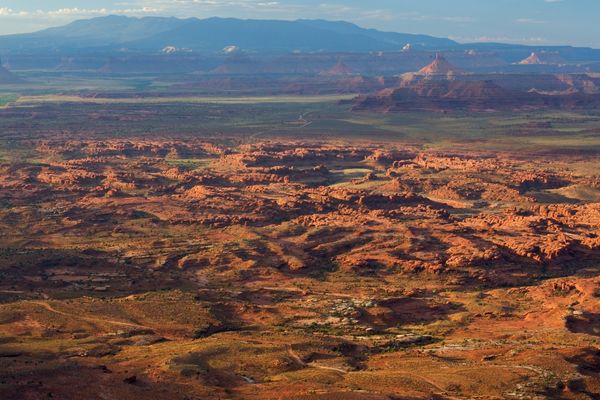
- Details
- By Darren Thompson
SALT LAKE CITY — On Friday, Dec. 9, the Hopi Tribe, Navajo Nation, Ute Mountain Ute Tribe, and the Pueblo of Zuni intervened in two lawsuits that aim to restore the original boundaries of the Bears Ears and Grand Staircase-Escalante National Monuments in Utah.
In 2017, former President Trump shrunk the boundaries of both monuments, which conservationists and Tribes argue stripped protections of American Indian religious sites.
 Make A Donation Here
Make A Donation Here
“Bears Ears sustains life,” Zuni Pueblo Lieutenant Governor Carleton R. Bowekaty said in a statement. “Bears Ears provides food, medicine, cultural items, and ceremony sites. As sovereign nations and Bears Ears National Monument co-managers, we have the right to intervene in these lawsuits. As stewards and people of this land, we hold a responsibility to protect Bears Ears.”
The state of Utah is challenging President Biden’s attempt to restore the original boundaries of both national monuments, saying that the Antiquities Act is illegal. Signed by President Theodore Roosevelt on Jun. 8, 1906, the Antiquities Act was the first U.S. law to provide general legal protection of cultural and natural resources of historic or scientific interest on Federal lands. The law set an important precedent by asserting a broad public interest in the preservation of resources on Federal lands, says the Department of Interior.
“President Trump shrank the Bears Ears National Monument by about 85 percent, to roughly 200,000 acres,” said attorneys in a motion to intervene and memorandum in support of President Biden’s proclamation to restore the monuments filed on Nov. 22. “He also shrank the Grand Staircase-Escalante National Monument by about 46 percent, to roughly 1 million acres.”
President Biden issued a proclamation on Oct. 8, 2021 that “confirmed, restored, and supplemented the boundaries and protection” for Bears Ears after recommendations by Interior Secretary Deb Haaland.
Want more Native News? Get the free daily newsletter today.
“Restoring the Bears Ears National Monument honors the special relationship between the Federal Government and Tribal Nations, correcting the exclusion of lands and resources profoundly sacred to Tribal Nations and ensuring the long-term protection of, and respect for, this remarkable and revered region,” reads the proclamation.
On Aug. 24, 2022, Utah filed suit challenging President Biden’s proclamations.
According to the Center for Biological Diversity, Bears Ears National Monument is home to ancient cliff dwellings, more than 100,000 Native American cultural sites, innumerable historic landmarks, and iconic wildlife such as bears, bighorn sheep and mountain lions. Tribes still have ceremonies within the park and consider it sacred.
President Clinton designated the Grand Staircase-Escalante National Monument in 1996. It’s often described as a “dinosaur Shangri-la” because its dinosaur fossils are not found anywhere else in the world. Since it was protected, paleontologists have unearthed fossils from 21 previously undiscovered dinosaur species.
Between the Trump and Biden proclamations, private interests have attempted to exploit the Bear Ears region, which has drawn people to its location for more than 13,000 years, according to the Native American Rights Fund (NARF). The oil and gas industry requested to exploit 60,000 acres within the original monument boundaries to the Bureau of Land Management, said NARF.
The tribes filed a motion to intervene on Nov. 18 in two lawsuits (Garfield County v. Biden and Dalton v. Biden) seeking to overturn President Biden’s 2021 proclamation that reaffirmed both the Bears Ears National Monument and the Grand Staircase-Escalante National Monument. On Dec. 8, 2022, U.S. Magistrate Judge Paul Kohler granted the Tribes motions to intervene.
“The two lawsuits seek to eviscerate the Antiquities Act and deprive Bears Ears of the protections it so desperately needs,” said NARF Deputy Director Matthew L. Campbell in a statement on Dec. 8. “The tribal governments will fight to protect these places.”
More Stories Like This
Gwich'in Tribal Governments Submit Comments Challenging Fish and Wildlife Service's Inadequate Environmental Review of Arctic Refuge Snow RoadRappahannock Tribe Challenges 9M-Gallon Water Plan
Feds release draft long-term plans for Colorado River management
Apache Leader Walks 60 Miles to Court Hearing That Will Decide Fate of Sacred Oak Flat
Rappahannock Tribe Raises Sovereignty and Environmental Concerns Over Caroline County Water Permit
Help us defend tribal sovereignty.
At Native News Online, our mission is rooted in telling the stories that strengthen sovereignty and uplift Indigenous voices — not just at year’s end, but every single day.
Because of your generosity last year, we were able to keep our reporters on the ground in tribal communities, at national gatherings and in the halls of Congress — covering the issues that matter most to Indian Country: sovereignty, culture, education, health and economic opportunity.
That support sustained us through a tough year in 2025. Now, as we look to the year ahead, we need your help right now to ensure warrior journalism remains strong — reporting that defends tribal sovereignty, amplifies Native truth, and holds power accountable.
 The stakes couldn't be higher. Your support keeps Native voices heard, Native stories told and Native sovereignty defended.
The stakes couldn't be higher. Your support keeps Native voices heard, Native stories told and Native sovereignty defended.
Stand with Warrior Journalism today.
Levi Rickert (Potawatomi), Editor & Publisher
